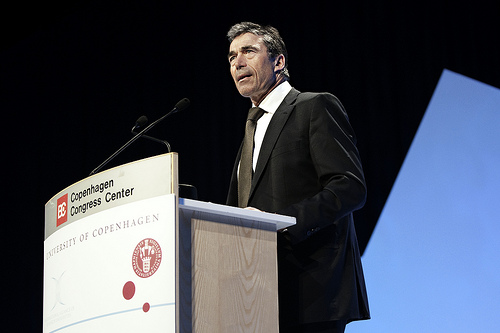At the culmination of the Climate Congress in Copenhagen last week (10-12 March 2009), representatives of the 2500 scientists who attended delivered a clear message to politicians that not enough is being done globally to combat climate change.
The primary aim of the congress was to capture and synthesize the recent research effort devoted to climate change and produce a set of clearly understandable conclusions to inspire politicians and the public around the world. A detailed synthesis is being produced to feed into negotiations in advance of COP15 at Copenhagen in December where policymakers will meet to formulate binding international climate change agreements.
Unveiled at the closing session, which was attended by the Danish prime minister Mr. Anders Fogh Rasmussen, the six preliminary key messages from the congress were:
- Climatic trends
Worse case IPCC scenario trajectories on greenhouse gas emissions are being realized with many scientists feeling that the situation could be even worse than is currently being predicted. There is significant deviation from natural variability in many key parameters including sea level rise, mean global surface temperatures, ocean and ice sheet dynamics, ocean acidification and extreme weather events. - Social disruption
Recent observations show that societies are highly vulnerable even to modest levels of climate change and temperatures above +2°C will be difficult to cope with. - Long-term strategy
It is clear that rapid, sustained and effective mitigation is required globally and regionally to avoid "dangerous climate change". Weaker targets for 2020 increase the risk of crossing tipping points which will make the task of hitting 2050 targets much more difficult. Further delay will significantly increase the long-term social and economic costs of mitigation and adaptation. - Equity dimensions
Climate change will impact some countries and regions more than others with many developing countries being at the sharp end. An effective, well funded adaptation safety net is needed to protect the poor and most vulnerable. - Inaction is inexcusable
Business as usual is not an option – we already have many technological, economic and managerial tools available to address climate change but they must be vigorously and widely implemented. As Lord Nicholas Stern pointed out during the conference, many benefits will flow from a switch to a low carbon-based economy. These include sustainable job growth, reduced health and economic costs, and restoration and revitalization of ecosystem services. - Meeting the challenge
In order to achieve societal transformation we must overcome several serious constraints and seize critical opportunities. These include overcoming existing inertia and building on the growing public desire for governments to show strong leadership on this issue, and, among other things, reduce the influence of vested interests that increase emissions and reduce resilience.
 After presenting the key concluding messages, Professor Katherine Richardson (University of Copenhagen) handed them to Anders Fogh Rasmussen who, in a speech, promised to take them to the negotiating table with other EU leaders. He stated that the EU is committed to a 30% reduction in emissions by 2020 but noted that even if developed countries cut their emissions to zero we will still not reach the 2050 target. Despite the work that needed to be done by developed countries in emission reduction, he felt that developing countries, in particular the emerging industrial economies, will still need to cut emissions to 20-30% under a business as usual level.
After presenting the key concluding messages, Professor Katherine Richardson (University of Copenhagen) handed them to Anders Fogh Rasmussen who, in a speech, promised to take them to the negotiating table with other EU leaders. He stated that the EU is committed to a 30% reduction in emissions by 2020 but noted that even if developed countries cut their emissions to zero we will still not reach the 2050 target. Despite the work that needed to be done by developed countries in emission reduction, he felt that developing countries, in particular the emerging industrial economies, will still need to cut emissions to 20-30% under a business as usual level.
Throughout the week whilst I was at Copenhagen, I felt like I was in a ringside seat at a turning point in history – a view also shared by one of the plenary speakers. Although we have become used to gloomy news reports highlighting sinister manifestations of climate change, this conference has shown that, despite the fact that dangerous climate change is looming, there is hope and I felt buoyed by a sense of optimism that real change is coming, and the supertanker is slowly starting to turn. Irrefutable evidence is now laid before us and it is up to us to act in whatever way we can and lobby our leaders to act on our behalf without further delay.
CABI's newest internet resource Environmental Impact attracted a good deal of interest and we were able to demonstrate the wealth of relevant content to researchers interested in gaining access to the best tools to assist them in their work in combating climate change.
In addition to the 1.1 million bibliographic database records (including PDFs of more than 6000 available), there are relevant commissioned CABI Reviews, ebooks, news articles, lists of climate change reports from key organizations, plus an events calendar and links.
Some of the most recent content added includes a review identifying hot spots requiring environmental improvement in the grain supply grain in Australia, one on climate change and the current food crisis and another examining impacts of climate change on biodiversity.
Many of the 56 environmental eBooks published by CABI and included in Environmental Impact are directly relevant to climate change including:
Environmental impacts of pasture-based farming by McDowell, R. W., et al.
Greenhouse gas sinks by Reay, D. S., et al.
Forestry and climate change by Freer-Smith, P. H., et al.
Climate change in developing countries: results from the Netherlands Climate Change Studies Assistance Programme by Drunen, M. A. van, et al.
If you are based at an institution and would like to arrange a free trial of Environmental Impact please contact us directly at sales@cabi.org
[Photo credit: Mr. Anders Fogh Rasmussen by Lizette Kabré]
1 Comment
Leave a Reply


What is the control in studying climate change? We only have one Earth so there is not a way to adjust a single variable while having a separate system to analyze the contribution of that single change.
I guess there must be scientist that are much more bold than myself. As a side note, I do not think reducing our imprint on the Earth will have negative impact.